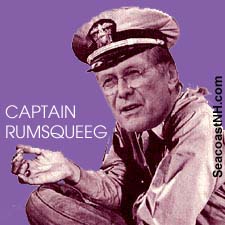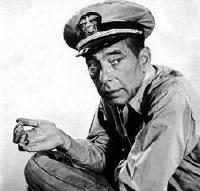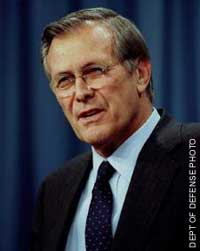|
FRESH STUFF DAILY |
|
|
||
|
|
||
|
|
||
|
SEE ALL SIGNED BOOKS by J. Dennis Robinson click here |
||
SEE NEXT EVENT at the Portsmouth Music Hall The timing was right for the L.A. Theatre Works’ thoughtful production of the Caine Mutiny Court Martial, staged recently at Portsmouth’s Music Hall. A grueling election season was finally behind us. We watched George Bush eat humble pie and Donald Rumsfeld fall on his sword, and I was more than willing to sit down, watch a play and try to put the past six years behind me. My internal dialogue went something like this: "Things are better now, right? We’re all going to work together and sort out the mess we made in Iraq. Let’s just move on." Yet the play and the discussion that followed reminded me that our shameful past is a bit like a fish — If you bury it before taking the guts out, it’s going to stink. This adaptation of Herman Wouk’s Pulitzer Prize-winning story is set almost entirely in a WW II military courtroom where the ship’s executive officer, Lieutenant Stephen Maryk, stands accused of mutiny. Maryk defends himself by explaining that the Caine was a ship in distress during a typhoon and the commanding officer, Lieutenant Commander Philip Queeg, has set it on a dangerous course. The Caine Mutiny, staged against the poisonous backdrop of the McCarthy era, challenges our notions of patriotism and protest. The play is still used in war colleges to help young officers understand when they are obliged to obey orders and when they are duty-bound to reject them.
The Music Hall arranged a panel discussion after the play, entitled "Responsibility and Conduct in Times of War." Participants included John Hutson, dean of Franklin Pierce Law Center, Douglas Wheeler, Professor of History Emeritus at UNH, and moderator Jon Greenberg, Executive Editor of New Hampshire Public Radio. Hutson, a former Navy JAG and expert in the laws of war, said the focus of the court martial was not Queeg’s emotional stability, but whether his gave the correct orders to keep the ship on course. It was a difficult determination to make because it all depended on Queeg’s judgment. If Queeg’s orders had placed the ship in danger, the subordinate officer had a duty to wrest control from the captain. I thought of Rumsfeld and searched for comparisons. The abuses at Abu Ghairb and elsewhere call the humanity of our entire nation into question. What better evidence than the embarrassment we faced recently when thousands of Indonesian protestors held signs accusing George Bush of war crimes?
In an August 2006 address before the American Legion Convention, Donald Rumsfeld accused his critics of "moral confusion" for appeasing terrorists, likening it to Nazi-coddling in the years leading up to WWII. Our ex-secretary of state may be haunted by those words. Questions about his own moral compass are about to be aired on an international stage. On November 14, 2006, a complaint was filed in a German federal court, charging Secretary of State Rumsfeld and other high-ranking U.S. officials with war crimes. The complaint, made on behalf of 12 prisoners held at Abu Ghairb and Guantánamo, accused Mr. Rumsfeld of "ordering" "aiding" or "failing to prevent" abusive interrogation techniques carried out in Iraq, Afghanistan and the military base at Guantanamo. The United Nations, the International Red Cross and the European Union have categorized these techniques as torture. This was articulated in a signed memo, posted on the walls at Abu Ghairb. A marginal note in the Secretary’s hand stated: "Make sure this gets done!" The suit paints a picture in echih Mr. Rumsfeld’s presence — micromanaging, bullying, demanding results — was clearly felt in Abu Ghairb when the worst abuses were taking place. Rumsfeld and others walk freely among us. Why are we in the United States not pursuing the matter ourselves? In a half-hearted attempt this fall to establish "acceptable" rules pertaining to the treatment of enemy combatants, Congress passed the Military Commissions Act of 2006. The horse-trading leading up to its passage also granted immunity to U.S. civilian and military officials who might have violated the Geneva Conventions during their conduct in the War on Terror. As such, Mr. Rumsfeld and other officials are immune from any attempts to hold them accountable. Human rights lawyers say the Act has forced them to seek justice outside the United States. Germany may be as good a place as any. Fox News radio host John Gibson blasted Germany for being one of those "friends" of the United States "who kick you when you’re up, and they kick you harder when you’re down." Yet who better to demand accountability for breaches of human dignity? Germans have spent many long years repenting their war crimes, making restitutions for their past. Germans have earned the right to defend the rules of war with some of that "moral courage" that Rumsfeld — whose own German relatives want nothing to do with him -- treasures so dearly. If the German Federal Prosecutor agrees to take on the case, he will do so using his recently-established authority to investigate and prosecute war crimes, irrespective of the defendant’s nationality or the country where the crime was committed. The prosecutor’s authority was established in conformance with the International Criminal Court, a court steeped in the legal history of the Nuremberg Trials. The Nuremberg trials conducted in post-war Germany are a reminder for soldiers everywhere of their obligation to disobey unlawful orders. (Another reminder came at the My Lai Massacre trial.) But this lesson is a reminder for us all. When a democratic country goes to war, a heavy burden is placed on all its citizens to uphold its humanity in spite of the threats. The responsibility to keep the ship on course belongs to us all. At a time when we long to find a workable solution for Iraq, are we too ready to turn out back on the human indignities the war has (and continues to) cause ? Will we be like the Chileans who ran away from their Pinochet past, forcing the rest of the world to finally yank the blinders off? Courage is easier to muster in some situations than others. …A fire starts in my house. I’ll risk my life to get the kids out. …A rapist attacks a woman on the street. I’ll do my best to help her free. … My country wages a war that degrades human dignity. I’ll call my congressman — maybe tomorrow. For the past six years, my sense of moral outrage has been on a slow leak. Every day a new disgrace at home and abroad. Dead people in the streets of Baghdad. Destitute people in the streets of New Orleans. I write a letter, send an email, vote. My moral courage drips away. Drip, drip, drip. Little acts — fingers in the dyke. Perhaps Mr. Rumsfeld is right. Perhaps I am morally confused. Maybe I have ceded my values for the sake of reconciliation . Maybe, more than anything else, I just want the fighting to stop so the country, and the rest of the world, can move on, to settle down, to talk, to erase poverty, end global warming and live in peace. Attending the Music Hall production and discussion group was an eye opener. This was a play about World War II – or was it? It helps to know that some people still have fight left in them. They know there’s no peace without justice. I’m grateful they’re willing to look the Beast in the eye and say, "Bring ‘Em On!" ABOUT THE AUTHOR Lydia Breen is a writer, filmmaker and evacuee from hurricane Katrina now living in Portsmouth. A committed believer in the principles of the Geneva Conventions, she worked for 15 years in Switzerland for the United Nations, the International Red Cross and other international organizations. SOURCE: For an explanation of the long-term physical and psychological effects of techniques designed to cause pain and humiliation, see Alfred McCoy’s excellent book, A Question of Torture: CIA Interrogation, from the Cold War to the War on Terror, Holt &Co,2006) OUTSIDE LINK Please visit these SeacoastNH.com ad partners.
News about Portsmouth from Fosters.com |
| Tuesday, April 30, 2024 |


|
Copyright ® 1996-2020 SeacoastNH.com. All rights reserved. Privacy Statement
Site maintained by ad-cetera graphics






 It wasn’t long into the production before I began to draw comparisons between the authoritarian Queeg and our soon-to-be-departed secretary of state. Captain Queeg was a perfectionist who would never admit he was wrong. ("In my fifteen months as commander aboard the Caine, I didn’t make a single mistake.") A rigid micromanager, he claimed his crew’s "disloyal" and undisciplined behavior forced him to do everything himself. ("I was captain, navigator and OOD [officer on deck] all in one.") Upon questioning by the defense attorney, Queeg slowly works himself into a rage, showing him to be unbalanced and paranoid.
It wasn’t long into the production before I began to draw comparisons between the authoritarian Queeg and our soon-to-be-departed secretary of state. Captain Queeg was a perfectionist who would never admit he was wrong. ("In my fifteen months as commander aboard the Caine, I didn’t make a single mistake.") A rigid micromanager, he claimed his crew’s "disloyal" and undisciplined behavior forced him to do everything himself. ("I was captain, navigator and OOD [officer on deck] all in one.") Upon questioning by the defense attorney, Queeg slowly works himself into a rage, showing him to be unbalanced and paranoid. In retrospect we know how despicable it was for the administration to claim that just a few "bad apples" were to blame at Abu Ghairb. We have all the evidence we need to prove that the interrogation techniques used to torture and humiliate prisoners came from the highest levels of government. At last, Mr. Rumsfeld will step down from office; he returns to private life with impunity. But has justice has been done? Does that mean we can just move on?
In retrospect we know how despicable it was for the administration to claim that just a few "bad apples" were to blame at Abu Ghairb. We have all the evidence we need to prove that the interrogation techniques used to torture and humiliate prisoners came from the highest levels of government. At last, Mr. Rumsfeld will step down from office; he returns to private life with impunity. But has justice has been done? Does that mean we can just move on? 














